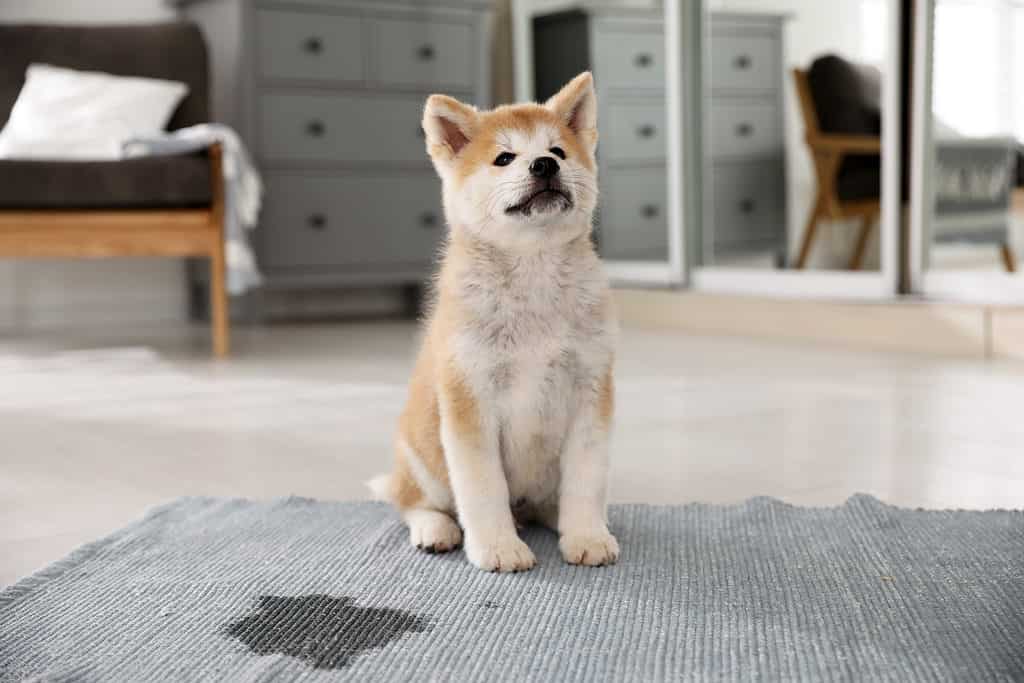When coming home from a long and tiring day at work, there is nothing better than being greeted at your door by a wagging tail and slobbery kisses. The love that beams from your excited pup can cause the stress of your day to melt away, but there is one thing that can ruin the beauty of this moment; a dog that pees during the excitement. A puddle of dog urine can put a damper on any special moment shared with your pup, so how do you put an end to this inconvenient behavior?
We want to help you better understand why your dog pees when they get excited, so let’s break down some of the most common causes of this behavior below. We will also discuss some of our favorite tips on ending submissive urination in dogs, so you can enjoy these exciting moments without the threat of stepping in a pile of pee.
Let’s get started!
Is Excited Urination Common In Dogs?

Though submissive urination occurs in dogs of all kinds, it is most common in young dogs under the age of 1.
©New Africa/Shutterstock.com
Before we discuss the details of this undesirable canine behavior, it’s important to understand just how common it is. Many dogs around the world struggle with holding their bladder when they get excited, so you are not alone when dealing with this frustrating behavior. It is so common that the behavior itself has a title, and it is often referred to as submissive urination.
Though submissive urination occurs in dogs of all kinds, it is most common in young dogs under the age of 1. This is likely due to the fact that young dogs are less confident than older dogs, which makes their excitement or nervousness much more difficult to manage. Most dogs will grow out of this behavior as they get older, but if the adult dog still struggles with feeling secure in their own skin, the behavior may persist as they age.
Why Does My Dog Pee So Much When Excited?
We know just how frustrating it can be if your dog pees each time they are excited or overwhelmed, so it’s time to get to the bottom of this inconvenient behavior! Let’s dive into some of the most common causes of submissive urination in dogs below, and we will then discuss some of the most effective ways to end the behavior after.
They Are Lacking Confidence
As we mentioned above, peeing with excitement is most common in young dogs. This is often due to the fact that they are not very secure in their own skin, and they may not have gained confidence through socialization and training just yet. A young dog that lacks confidence may struggle with a variety of undesirable behaviors, and submissive urination is just one of them.
If your young dog pees each time they are excited or overwhelmed, cowers or appears fearful in new situations, barks at new people, barks in unfamiliar settings, and falls into submissive postures often, then they are likely struggling with a lack of confidence.
They Are Being Submissive
If you have a dog that is a bit shy and anxious, then they likely pee when they are excited due to having a submissive nature. This can occur due to the fact that the dog is just naturally on the timid side, but it can also mean they have not been properly socialized and trained just yet. Dogs that are peeing due to being submissive may also roll over and expose their belly, tuck their tail, cower to new people and animals, and even whine during greetings.
Submissive urination in dogs can also occur when the dog is not being disciplined properly, especially if they receive negative reinforcement for peeing when excited or jumping on people when they are excited. This is very common in rescue dogs, as you just never know the type of punishment or training structure the dog received in their previous home.
They Are Overwhelmed With Excitement
If your dog only pees when you are walking through the door, when meeting new people, or when meeting new dogs, then your pup might just struggle with containing their excitement. Some dogs simply cannot hold their bladder when they are experiencing overwhelming excitement, and this can lead to a puddle of urine during their moments of happiness. Thankfully for most furry friends and their frustrated pet parents, most young dogs will grow out of this as they get older and learn how to control their bladder.
They Are Afraid Of Something
Does it seem like your dog only experiences submissive urination during stressful or scary moments? If so, they may just struggle to hold their bladder when they are afraid. These dogs may pee each time they walk into the vet’s office, pee indoors when there are loud noises outside of their home, and during any other moment that is stressful. In these situations, many dogs will need to be desensitized to the situation they are afraid of, as well as boosting their confidence through socialization and obedience training.
They Are Struggling With Separation Anxiety
If your canine companion struggles with separation anxiety, then they might experience intense excitement each time you come home. Sometimes these feelings can be so overwhelming for the dog with separation that they will pee as they greet you, leading to an undesirable habit each time you walk through the door.
If your dog does struggle with separation anxiety, there are likely other signs in addition to their submissive urination. A dog with separation anxiety may bark or howl when left alone, they may pace and pant when you leave a room, they may resort to destructive behavior, and they might have accidents around your house each time you are away. In these situations, the best way to resolve the submissive urination is by addressing the separation anxiety itself.
They Have A Urinary Condition
If your dog that can typically control their bladder suddenly begins to pee each time they are excited or nervous, then it could point to an underlying urinary condition. A urinary condition can make it challenging for a dog to hold their pee when their bladder is full, leading to an increased risk of accidents around your home. These pups may also experience an increased urge to pee, and this can also cause your dog to pee at inappropriate times. This is very common in dogs with a urinary tract infection (UTI).
Dogs with an underlying urinary condition may also struggle with constant squatting or peeing when outside, peeing small amounts at a time, pain when urinating, a change in urine color, foul smelling urine, and even blood in their urine. If you notice any of these symptoms in your canine companion, then we suggest having them seen by a veterinarian as soon as possible.
They Have An Underlying Health Condition
There are a list of medical conditions in dogs that can lead to an increase in urination. These medical complications can cause a dog to pee more often, often leading to accidents around your home and changes in behavior. Sometimes these pups will pee when they become too excited or overwhelmed, as it is just too hard to control their full bladder.
Thankfully for any concerned pet parents, many of these medical conditions will lead to other noticeable symptoms that you can be on the lookout for. A dog with an underlying medical condition may experience increased thirst, changes in appetite, lethargy, GI upset, changes in their coat appearance, weight loss, and any other change in their normal behavior. If you think your dog’s behavior has changed in addition to peeing when they are excited, then we suggest having them assessed by your vet to be safe.
How To Stop Submissive Urination In Dogs

Submissive urination often points to a lack of confidence in dogs, which is why it is so common in young canine friends.
©New Africa/Shutterstock.com
Now that you know why your dog might be peeing each time they are excited, it’s time to discuss some of our favorite tips on how to banish your dog’s submissive urination once and for all!
Rule Out Any Medical Causes
Before you can begin to implement training and socialization for your dog with submissive urination, you should first rule out any underlying medical causes. If a health complication is to blame for your dog’s accidents, then no amount of training will correct it. This is especially important if your dog that never has accidents suddenly begins to pee when excitement, as this sudden behavioral change can point to urinary complications or other medical complications that need to be addressed.
Help Them Boost Their Confidence
Submissive urination often points to a lack of confidence in dogs, which is why it is so common in young canine friends. These pups need some help with feeling secure in their own skin, and this can typically be achieved through obedience training and socialization. Some of the most effective ways to boost your dog’s confidence is through consistent obedience training (basic commands), introducing them to new surroundings, bringing them around new people, introducing them slowly to other dogs, and exposing them to any other situations they struggle with. When doing this gradually and safely, your dog can slowly build up their confidence.
Learn What Usually Triggers Them & Desensitize
Does it seem like your dog has a specific trigger that causes them to urinate in your home? If so, then it is time to work on desensitizing this trigger for your canine friend. For example, if your dog only pees when new people bend down and greet your dog, then we suggest asking new people to be calm around your pup and to avoid interacting with them immediately. Once your dog gets used to the new person and calms down, then the new person can pet them calmly. By identifying your dog’s trigger, you can establish an action plan on how to resolve the issue moving forward.
Do Not Punish Them
No matter how frustrated you become with your dog’s submissive urination, it is important to avoid any form of negative punishment. Yelling at your dog will only make it more challenging for them to hold their bladder, as this will only decrease their confidence and increase their level of fear. Submissive urination is often fear based or revolves around a lack of security in their own skin, so negative punishments will only make the situation worse. We know this can be a frustrating process, but offering your dog patience and support is the best way to resolve this behavior.
Final Thoughts
A dog that pees each time they are excited is often struggling with a lack of confidence. Most pups will either grow out of this behavior by the time they reach adulthood, or when their pet parents implement training and socialization. Be sure to review the tips on banishing submissive urination that we discussed above, and your pup will be on their way to pee-free excitement in no time!
Up Next:
- Read the Best Dog Training Books: 2022
- 5 Sure-Fire Ways To Treat Your Dog’s Separation Anxiety
- This Is How Long Dogs Can Hold Their Pee (Varies By Age)
The photo featured at the top of this post is © New Africa/Shutterstock.com
Ready to discover the top 10 cutest dog breeds in the entire world?
How about the fastest dogs, the largest dogs and those that are -- quite frankly -- just the kindest dogs on the planet? Each day, AZ Animals sends out lists just like this to our thousands of email subscribers. And the best part? It's FREE. Join today by entering your email below.
Sources
- Humane Society, Available here: https://www.humanesociety.org/resources/dog-submissive-urination-solutions#:~:text=Submissive%20urination%20is%20a%20behavior,also%20occur%20in%20adult%20dogs.
- (1970)
Thank you for reading! Have some feedback for us? Contact the AZ Animals editorial team.







